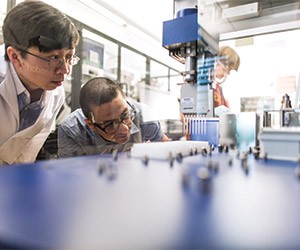An economic powerhouse a century ago, like many Rust Belt cities St. Louis and its formidable brick-and-mortar industrial buildings have since slipped from prominence as the global economy shifted the centers of manufacturing overseas.
Now innovation and collaboration are the coins of the realm, and St. Louis is poised to capitalize through a couple of bold incubators focusing on the biomedical and agricultural science and research industries.
Cortex Innovation Community
Founded in 2001, the nonprofit Cortex Innovation Community serves as the brain center of this transformation.
“We had these great assets for 100 years but weren’t leveraging them—now we are,” said Ben Johnson, vice president, programs for BioSTL, an organization developed to champion St. Louis’ nascent bioscience research effort. “There’s a perception of St. Louis as an old, dying Rest Belt City. We’ve never done a good job of showing people how things have changed.”
And changing they are. If you’ve used the anti-inflammatory drug Celebrex to treat your arthritis, you have the bioscience incubator at Cortex, where it was developed before going to market, to thank.
The first building in the Cortex district was opened in 2004, and now the area spreads out over 200 acres of former factory land and boasts $1 billion in residential development surrounding it, according to Johnson. Cortex is also attracting ancillary businesses such as restaurants to serve the area, with rumors of a new Aloft hotel also afoot.
The primary facilities in Cortex include the following:
- CET St. Louis (Center for Emerging Technologies), which provides infrastructure and resources for bioscience, IT and other startups.
- BioGenerator, a nonprofit subsidiary of BioSTL that currently supports more than 60 startups that cycle in and out starting at the beginning of a bioscience products lifecycle, sharing a communal laboratory.
- CIC St. Louis, a co-working environment that serves startups in fields such as p.r., legal and academic, among others, with 32,000 square feet of space and the Innovation Hall, with a capacity for 100 that could make for a good off-site breakout space for innovation-focused groups convening in St. Louis.
- Venture Cafe St. Louis, a
- nonprofit organization that fosters collaboration of innovators in a variety of industries.
- TechShop, an open-access DIY workshop and fabrication studio that provides access to instructional classes, events that bring innovators together to collaborate and both tech and traditional tools such as a machine shop to facilitate production.
And even new “legacy” companies are starting to set up a major presence in Cortex, with Microsoft planning to open its Mid-America Division headquarters in a new building there.
The end result is positioning the grande dame of the Mississippi, St. Louis, for the future, attracting the best and the brightest to innovate in an environment where one may run across massive industrial boilers from early in the last century, but which are now used only as a design element in a repurposed former factory.
“This has been a sustained commitment for 15 years,” Johnson said. “We’re transforming an economy. We’re building an industry. This is a generational effort.”
Donald Danforth Plant Science Center
Founded by an heir of St. Louis legacy company Ralston Purina and supported by yet another local legacy company, Monsanto, via a land donation, the Donald Danforth Plant Science Center supports 20 agricultural science teams with more than 150 scientists from more than 22 countries. This center of innovation, located on the outskirts of St. Louis, specializes in bio-engineering with a mission to “improve the human condition through plant science.”
Wandering through the 40-acre facility—plans are afoot for a nearly 600-acre innovation district surriounding it—the center’s many laboratories and greenhouses focus on increasing crop yield and exploring alternative fuel options that may be provided by plants. The Danforth Center, which selected St. Louis following a bid process primarily because the area boasts approximately 750 people with plant science Ph.D.s, also rents space for external users.
“Forty-five percent of our research goes to developing countries,” said Karla Roeber, vice president, public and government affairs for the Donald Danforth Plant Science Center, during a tour of the grounds.
For more information:
Cortex Innovation Community: http://cortexstl.com
Donald Danforth Plant Science Center: www.danforthcenter.org




